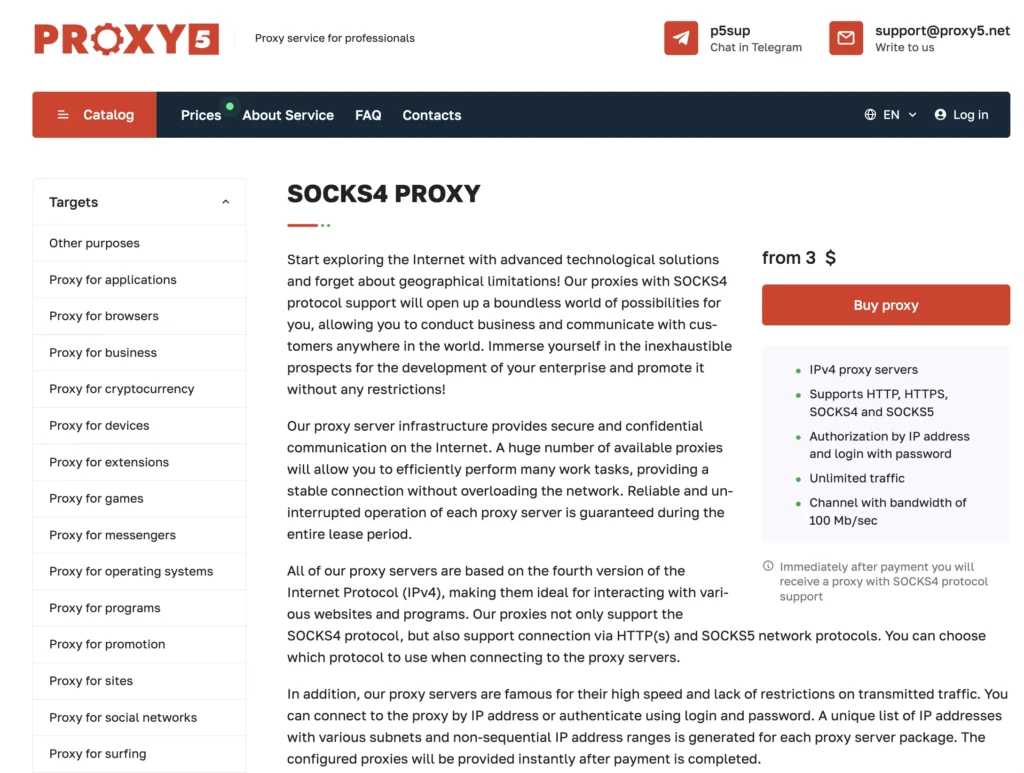In the realm of internet security and anonymity, proxies play a crucial role. SOCKS4 proxies, in particular, are popular for their simplicity and efficiency in handling data traffic. This article delves into what SOCKS4 proxies are, why they are necessary, and where you can purchase them.
What is a SOCKS4 Proxy?
A SOCKS4 proxy is a type of proxy server that routes network packets between a client and a server using the SOCKS4 protocol. This protocol is specifically designed to handle TCP (Transmission Control Protocol) traffic, making it suitable for various internet applications that require reliable data transmission. SOCKS4 proxies function at the session layer of the OSI model, which allows them to manage and forward data without interpreting it.
SOCKS4 proxies are known for their simplicity and efficiency. They provide a straightforward way to handle internet traffic by simply forwarding packets from the client to the destination server and back. This process masks the client’s IP address, providing a level of anonymity and privacy. However, unlike more advanced versions like SOCKS5, SOCKS4 does not support UDP (User Datagram Protocol) traffic or advanced authentication methods.
The primary function of SOCKS4 proxies is to facilitate secure and anonymous browsing by hiding the user’s IP address. This makes them an excellent choice for bypassing firewalls and accessing restricted content. Additionally, because SOCKS4 proxies do not interpret the data they handle, they can be used with various protocols and applications, making them versatile and widely applicable.
Why Are SOCKS4 Proxies Needed and How Are They Used?
SOCKS4 proxies serve multiple purposes, providing numerous benefits for both personal and professional use. Here are some key reasons why they are needed and how they are typically utilized:
Anonymity and Privacy: By masking the user’s IP address, SOCKS4 proxies ensure that online activities remain private and untraceable. This is crucial for protecting personal information and browsing habits from being tracked.
Bypassing Geo-Restrictions: SOCKS4 proxies allow users to access content that is restricted based on geographical locations. This is particularly useful for streaming services, online shopping, and accessing region-specific websites.
Enhanced Security: SOCKS4 proxies act as an additional layer of security by preventing direct access to the client’s device. This helps protect against cyber threats such as hacking, phishing, and malware.
Improved Performance: By managing and optimizing traffic flow, SOCKS4 proxies can enhance network performance, reducing latency and improving connection speeds.
Bandwidth Management: They help in managing bandwidth usage by caching frequently accessed content and distributing network load efficiently.
Web Scraping: Businesses use SOCKS4 proxies for web scraping, collecting data from websites without being blocked or restricted. This is essential for competitive analysis, market research, and SEO optimization.
Gaming: Gamers use SOCKS4 proxies to reduce lag and access games or servers that are region-locked, ensuring a better gaming experience.
Testing and Development: Developers use SOCKS4 proxies to test websites and applications from different geographical locations and network environments, ensuring they function correctly under various conditions.
P2P Sharing: SOCKS4 proxies are commonly used for peer-to-peer (P2P) file sharing, as they can handle the high volume of data transfer and maintain anonymity.
Avoiding Network Censorship: Users in regions with strict internet censorship can use SOCKS4 proxies to bypass restrictions and access the open internet freely.
In summary, SOCKS4 proxies offer a versatile solution for enhancing privacy, security, and network performance. Their ability to handle various types of internet traffic makes them suitable for a wide range of applications, from personal privacy to professional data management.
Comparison of SOCKS4 and SOCKS5 Proxy Protocols
SOCKS proxies are widely used for managing internet traffic and enhancing online privacy and security. SOCKS4 and SOCKS5 are the two main versions of this protocol, each with distinct features and capabilities. This article compares SOCKS4 and SOCKS5 proxies to highlight their differences and help users choose the appropriate version for their needs.

SOCKS4 Proxy Protocol
SOCKS4 is an older version of the SOCKS protocol, designed to handle TCP (Transmission Control Protocol) traffic. It provides a basic proxying service that routes data packets between the client and the server without interpreting the data. This ensures anonymity by hiding the client’s IP address. However, SOCKS4 has several limitations:
Support: SOCKS4 supports only TCP connections, making it less versatile than newer protocols.
Authentication: The authentication method in SOCKS4 is basic, typically involving a simple username.
Features: SOCKS4 lacks advanced features such as support for UDP (User Datagram Protocol) and IPv6 addresses, as well as domain name resolution.
SOCKS5 Proxy Protocol
SOCKS5 is an enhanced version of the SOCKS protocol, offering greater flexibility and advanced features compared to SOCKS4. It supports both TCP and UDP, making it suitable for a wider range of applications. Key characteristics of SOCKS5 include:
Support: SOCKS5 supports both TCP and UDP, allowing for more versatile data transmission.
Authentication: SOCKS5 includes advanced authentication methods, such as username/password and GSS-API (Generic Security Services Application Program Interface), providing better security.
Features: SOCKS5 supports IPv6 addresses, domain name resolution, and other advanced features, making it more capable of handling modern internet requirements.
The primary differences between SOCKS4 and SOCKS5 proxies lie in their support for various protocols, authentication methods, and additional features. SOCKS4 offers simplicity and ease of implementation but is limited to TCP connections and basic authentication. SOCKS5, on the other hand, provides enhanced functionality with support for both TCP and UDP, advanced authentication, and additional capabilities like IPv6 and domain name resolution.
Choosing between SOCKS4 and SOCKS5 depends on the specific needs and requirements of your internet activities. For most users, SOCKS5 is the superior choice due to its versatility, security, and support for modern internet standards. Understanding these differences ensures you select the proxy protocol that best suits your needs.
Comparison of Paid and Free SOCKS4 Proxies
SOCKS4 proxies are essential for managing internet traffic, providing anonymity, and enhancing security. When considering SOCKS4 proxies, users often face the choice between paid and free options. This article compares paid and free SOCKS4 proxies, highlighting their differences in reliability, performance, security, and overall value.

Free SOCKS4 Proxies
Free SOCKS4 proxies are attractive due to their cost-free nature, but they come with significant drawbacks:
- Reliability: Free proxies often suffer from instability and frequent downtimes, as they are shared among many users. This can lead to inconsistent performance and interruptions in service.
- Performance: These proxies tend to be slower because the bandwidth is divided among multiple users, resulting in reduced connection speeds.
- Security: Free proxies generally lack robust security features, making them vulnerable to cyber attacks. There is also a risk of using malicious proxies set up to steal user data.
- Privacy: With free proxies, there is no guarantee of privacy. The lack of proper encryption and security measures can expose your personal information to potential threats.
- Support: Free proxies typically do not offer customer support, leaving users to troubleshoot issues on their own.
Paid SOCKS4 Proxies
Paid SOCKS4 proxies, while requiring a subscription fee, offer numerous advantages that justify their cost:
- Reliability: Paid proxies are known for their high reliability and stability. Providers ensure consistent uptime and performance by limiting the number of users sharing the same proxy.
- Performance: These proxies offer higher speeds due to better bandwidth allocation. Users experience faster and more stable connections.
- Security: Paid proxies come with advanced security features, including strong encryption and authentication methods, protecting your data from cyber threats.
- Privacy: With paid services, privacy is a top priority. They often implement strict no-logs policies and enhanced encryption to ensure your online activities remain anonymous and secure.
- Support: Paid proxy services offer dedicated customer support to help users with any issues or questions, ensuring a better overall experience.
- Customization: Users often have access to customizable options and additional features that free proxies do not offer.
When it comes to purchasing SOCKS4 proxies, selecting a reputable provider is crucial to ensure quality and reliability. One recommended provider is Proxy5.net, which offers a range of SOCKS4 proxies tailored to meet different needs. By choosing such a reliable and quality proxy service, you gain access to high-speed, reliable proxies with robust security features. Investing in quality SOCKS4 proxies from a trusted provider ensures enhanced privacy, security, and overall internet performance, making your online activities safer and more efficient.

While free SOCKS4 proxies may seem appealing due to their lack of cost, they come with significant drawbacks in terms of reliability, performance, security, and privacy. Paid SOCKS4 proxies, although requiring a financial investment, provide superior performance, enhanced security, and reliable customer support. For users who prioritize stability, speed, and data protection, investing in paid SOCKS4 proxies is a wise decision. Understanding these differences can help you choose the proxy service that best fits your needs, ensuring a safer and more efficient internet experience.
Stay in touch to get more updates & news on gossips.blog!




